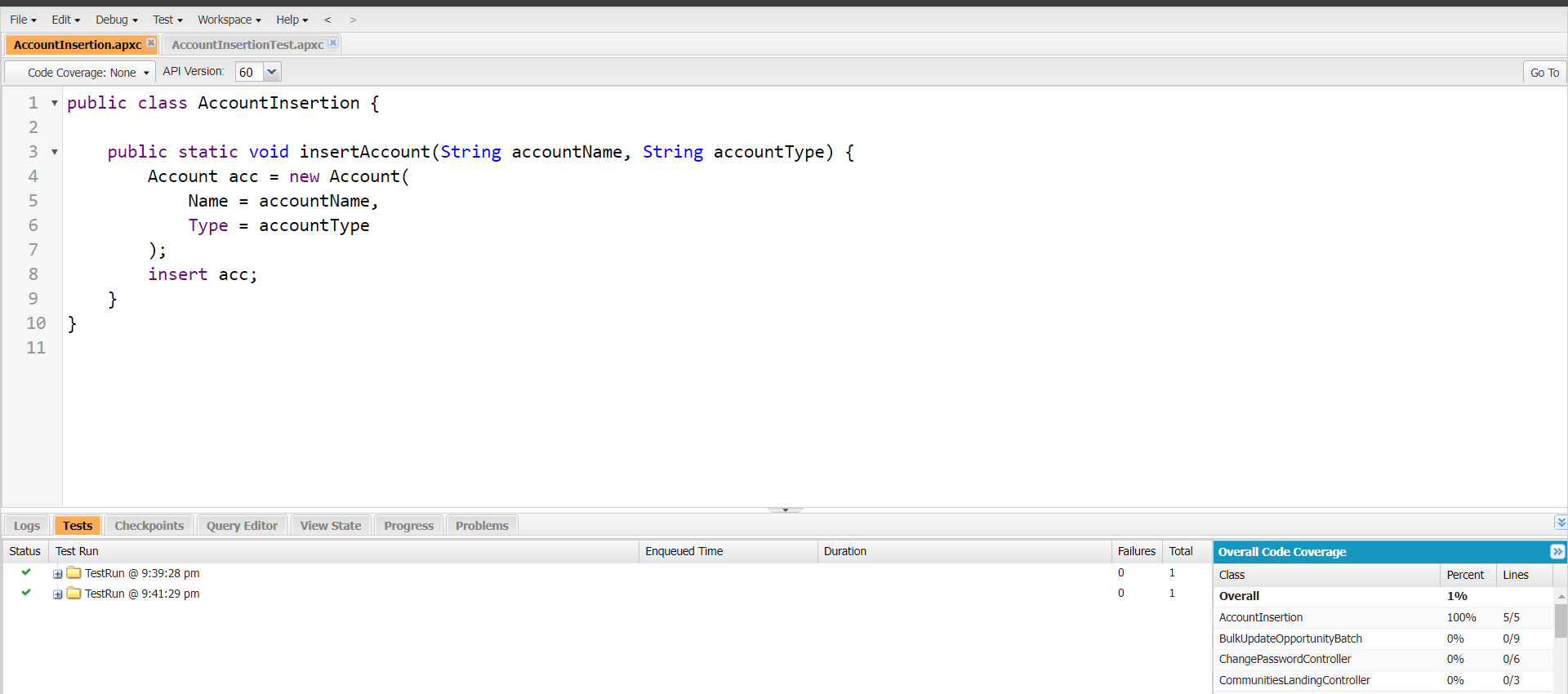Introduction:
Salesforce Apex Test classes play a critical role in ensuring the reliability and functionality of your code. They not only validate that your code behaves as expected but also contribute to the overall success of your Salesforce implementation. In this blog, we'll explore essential best practices related to Apex test classes, accompanied by examples to illustrate each principle.

1. Maintain Code Coverage:
Salesforce enforces a minimum Code Coverage requirement (75% for Apex classes and 1% for triggers). Ensure that your test classes cover the majority of your codebase to catch potential issues early.
Example:
@isTest
public class MyApexClassTest {
@isTest
static void testMethod() {
// Test logic goes here
// Ensure to cover various scenarios
}
}
Code Fragment 1: Syntax of an Apex test class
2. Isolation of Test Data:
Create the necessary test data within the test class, ensuring that the tests are isolated from the data in your Salesforce org. Avoid relying on existing records that may change over time.
Example:
@isTest
public class MyApexClassTest {
@isTest
static void testMethod() {
// Create test data
Account testAccount = new Account(Name = 'Test Account');
insert testAccount;
// Test logic goes here using testAccount
}
}
Code Fragment 2: Syntax of an Apex method in test class
3. Test Bulk Operations:
Salesforce processes records in bulk, and your test classes should reflect this reality. Test scenarios with multiple records to ensure your code handles bulk operations effectively.
Example:
@isTest
public class MyApexClassTest {
@isTest
static void testBulkOperation() {
List testAccounts = new List();
for (Integer i = 0; i < 200; i++) {
testAccounts.add(new Account(Name = 'Test Account ' + i));
}
insert testAccounts;
// Test logic for bulk operation goes here
}
}
Code Fragment 3: Apex test class for testing bulk records
4. Avoid Using SeeAllData=True:
Avoid relying on existing data by using the `@isTest(SeeAllData=false)` annotation. This ensures that your tests are independent of org data and can run in any environment.
Example:
@isTest(SeeAllData=false)
public class MyApexClassTest {
@isTest
static void testMethod() {
// Test logic goes here, relying on test data created within the class
}
}
Code Fragment 4: Avoid using @isTest(SeeAllData=false) annotation in Apex test class.
5. Test Exception Scenarios:
Ensure your test classes cover scenarios where exceptions might occur. This helps validate that your code handles errors gracefully.
Example:
@isTest
public class MyApexClassTest {
@isTest
static void testExceptionScenario() {
try {
// Code that may throw an exception
} catch (Exception e) {
// Assert statements to validate the expected exception
}
}
}
Code Fragment 5: Syntax to handle exceptions in Apex test class.
6. Use System.assert Statements:
Leverage `System.assert` statements to validate that your code behaves as expected. These assertions act as checkpoints during test execution. This ensures that the functionality is working as designed.
Example:
@isTest
public class MyApexClassTest {
@isTest
static void testMethod() {
Account testAccount = new Account(Name = 'Test Account');
insert testAccount;
// Test logic goes here
System.assertEquals('Expected Value', testAccount.Field__c, 'Error
message if assertion fails');
}
}
Code Fragment 6: Syntax to use System.assertEquals to validate your code in Apex test class.
Example:
Apex class to insert account records.
public class AccountInsertion {
public static void insertAccount(String accountName, String accountType) {
Account acc = new Account(
Name = accountName,
Type = accountType
);
insert acc;
}
}
Test Class for above Apex class.
@isTest
public class AccountInsertionTest {
@isTest
static void testInsertAccount() {
// Define test data
String testAccountName = 'Test Account';
String testAccountType = 'Prospect';
// Call the method to insert the account
Test.startTest();
AccountInsertion.insertAccount(testAccountName, testAccountType);
Test.stopTest();
// Retrieve the inserted account
Account insertedAccount = [SELECT Id, Name, Type FROM Account WHERE Name = :testAccountName LIMIT 1];
// Verify that the account was inserted with the correct values
System.assertNotEquals(null, insertedAccount, 'Account should not be null');
System.assertEquals(testAccountName, insertedAccount.Name, 'Account Name should match');
System.assertEquals(testAccountType, insertedAccount.Type, 'Account Type should match');
}
}

Figure 1: Code coverage of Apex class by test class.
Conclusion
Effective Apex test classes are foundational to the success of your Salesforce development efforts. By following these best practices and incorporating them into your development workflow, you'll not only meet Salesforce's testing requirements but also create a robust and reliable codebase that stands the test of time. Remember, well-tested code is the key to a successful and maintainable Salesforce implementation.
For any queries please reach out to support@astreait.com